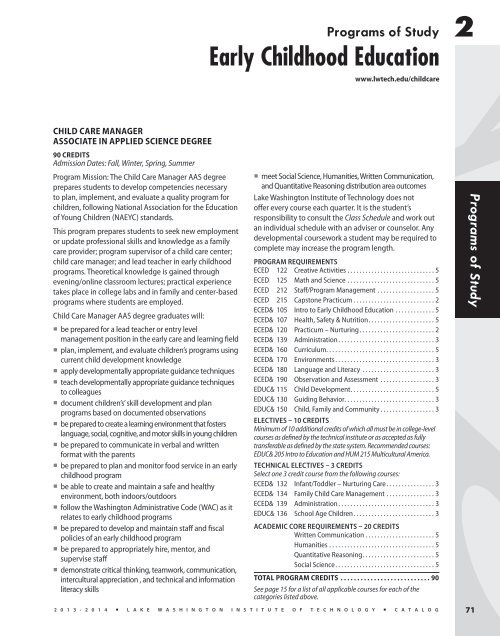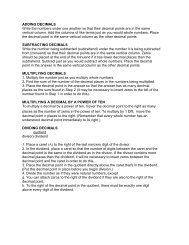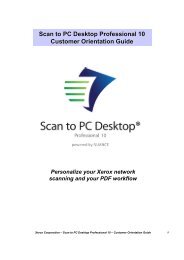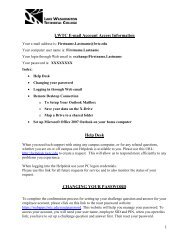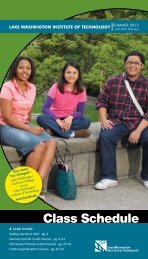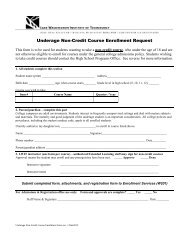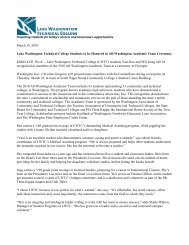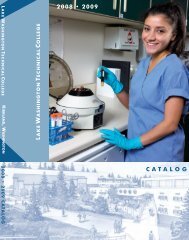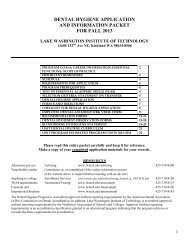2 - Lake Washington Institute of Technology
2 - Lake Washington Institute of Technology
2 - Lake Washington Institute of Technology
You also want an ePaper? Increase the reach of your titles
YUMPU automatically turns print PDFs into web optimized ePapers that Google loves.
Programs <strong>of</strong> Study 2<br />
Early Childhood Education<br />
www.lwtech.edu/childcare<br />
CHILD CARE MANAGER<br />
ASSOCIATE IN APPLIED SCIENCE DEGREE<br />
90 CREDITS<br />
Admission Dates: Fall, Winter, Spring, Summer<br />
Program Mission: The Child Care Manager AAS degree<br />
prepares students to develop competencies necessary<br />
to plan, implement, and evaluate a quality program for<br />
children, following National Association for the Education<br />
<strong>of</strong> Young Children (NAEYC) standards.<br />
This program prepares students to seek new employment<br />
or update pr<strong>of</strong>essional skills and knowledge as a family<br />
care provider; program supervisor <strong>of</strong> a child care center;<br />
child care manager; and lead teacher in early childhood<br />
programs. Theoretical knowledge is gained through<br />
evening/online classroom lectures; practical experience<br />
takes place in college labs and in family and center-based<br />
programs where students are employed.<br />
Child Care Manager AAS degree graduates will:<br />
be prepared for a lead teacher or entry level<br />
management position in the early care and learning field<br />
plan, implement, and evaluate children’s programs using<br />
current child development knowledge<br />
apply developmentally appropriate guidance techniques<br />
teach developmentally appropriate guidance techniques<br />
to colleagues<br />
document children’s’ skill development and plan<br />
programs based on documented observations<br />
be prepared to create a learning environment that fosters<br />
language, social, cognitive, and motor skills in young children<br />
be prepared to communicate in verbal and written<br />
format with the parents<br />
be prepared to plan and monitor food service in an early<br />
childhood program<br />
be able to create and maintain a safe and healthy<br />
environment, both indoors/outdoors<br />
follow the <strong>Washington</strong> Administrative Code (WAC) as it<br />
relates to early childhood programs<br />
be prepared to develop and maintain staff and fiscal<br />
policies <strong>of</strong> an early childhood program<br />
be prepared to appropriately hire, mentor, and<br />
supervise staff<br />
demonstrate critical thinking, teamwork, communication,<br />
intercultural appreciation , and technical and information<br />
literacy skills<br />
meet Social Science, Humanities, Written Communication,<br />
and Quantitative Reasoning distribution area outcomes<br />
<strong>Lake</strong> <strong>Washington</strong> <strong>Institute</strong> <strong>of</strong> <strong>Technology</strong> does not<br />
<strong>of</strong>fer every course each quarter. It is the student’s<br />
responsibility to consult the Class Schedule and work out<br />
an individual schedule with an adviser or counselor. Any<br />
developmental coursework a student may be required to<br />
complete may increase the program length.<br />
PROGRAM REQUIREMENTS<br />
ECED 122 Creative Activities. .............................5<br />
ECED 125 Math and Science. .............................5<br />
ECED 212 Staff/Program Management ....................5<br />
ECED 215 Capstone Practicum. ...........................2<br />
ECED& 105 Intro to Early Childhood Education. .............5<br />
ECED& 107 Health, Safety & Nutrition. ......................5<br />
ECED& 120 Practicum – Nurturing. .........................2<br />
ECED& 139 Administration. ................................3<br />
ECED& 160 Curriculum. ....................................5<br />
ECED& 170 Environments. .................................3<br />
ECED& 180 Language and Literacy .........................3<br />
ECED& 190 Observation and Assessment ...................3<br />
EDUC& 115 Child Development. ............................5<br />
EDUC& 130 Guiding Behavior. ..............................3<br />
EDUC& 150 Child, Family and Community. ..................3<br />
ELECTIVES – 10 CREDITS<br />
Minimum <strong>of</strong> 10 additional credits <strong>of</strong> which all must be in college-level<br />
courses as defined by the technical institute or as accepted as fully<br />
transferable as defined by the state system. Recommended courses:<br />
EDUC& 205 Intro to Education and HUM 215 Multicultural America.<br />
TECHNICAL ELECTIVES – 3 CREDITS<br />
Select one 3 credit course from the following courses:<br />
ECED& 132 Infant/Toddler – Nurturing Care. ................3<br />
ECED& 134 Family Child Care Management. ................3<br />
ECED& 139 Administration. ................................3<br />
EDUC& 136 School Age Children. ...........................3<br />
ACADEMIC CORE REQUIREMENTS – 20 CREDITS<br />
Written Communication. .......................5<br />
Humanities. ...................................5<br />
Quantitative Reasoning. ........................5<br />
Social Science. .................................5<br />
TOTAL PROGRAM CREDITS ............................90<br />
See page 15 for a list <strong>of</strong> all applicable courses for each <strong>of</strong> the<br />
categories listed above.<br />
2 0 1 3 - 2 0 1 4 • L A K E W A S H I N G T O N I N S T I T U T E O F T E C H N O L O G Y • C A T A L O G 71<br />
Programs <strong>of</strong> Study


